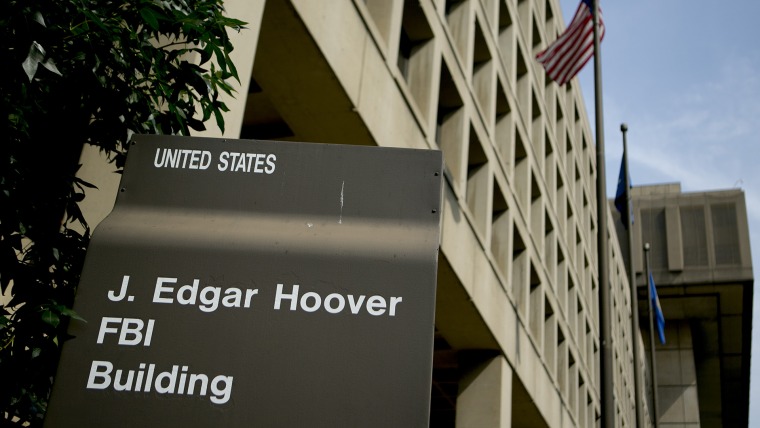Donald Trump has been accused of different kinds of financial corruption since becoming president, but his role in the FBI headquarters controversy stands out for a reason. It makes sense that Democratic committee chairs are demanding answers.
Today, the Chairs of five House Committees and Subcommittees sent a letter demanding documents that are currently being withheld by the Trump Administration relating to the decision to block the longstanding plan to relocate the Federal Bureau of Investigation (FBI) headquarters to a suburban location -- which would have allowed commercial developers to acquire the existing site and compete directly with the Trump Hotel across the street on Pennsylvania Avenue -- and instead raze and rebuild at the existing location.
For those who might need a refresher, let's recap how we reached this point.
As regular readers know, Trump’s keen interest in the FBI’s headquarters has been at the center of a controversy for nearly a year. Axios reported last summer, for example, that there was a contentious debate about whether to leave the FBI where it is or relocate the bureau’s headquarters to a nearby suburb.
The president made it clear he was “dead opposed to plans to move it out of D.C.”
Asked for an explanation, White House Press Secretary Sarah Huckabee Sanders told reporters in October, “The president wanted to save the government money,” which is why he directly intervened in the project. As the Wall Street Journal reported in November, Sanders’ argument wasn’t true.
New documents suggest the Trump administration was aware that its decision to keep the FBI headquarters in downtown Washington, D.C., would cost more than a competing proposal to relocate to the suburbs, contradicting public assertions from the White House that it wanted to save taxpayers money.A newly released email exchange shows that Andrew Abrams, deputy associate director of the White House’s Office of Management and Budget, attempting to prepare Emily Murphy, chief of the General Services Administration, for testimony before Congress about the FBI headquarters.In the email, Mr. Abrams says the toughest question Ms. Murphy could receive is, “How is this a good deal for taxpayers?” The email doesn’t dispute that the proposal to keep the facility in Washington would cost more and be less secure than relocating to the suburbs in Virginia or Maryland.
Given the last two years, I can appreciate why a “White House lies about a thing” story may seem uninteresting, but don’t be too quick to dismiss this one. We’re talking about a controversy that points to possible presidential corruption, which now also appears to involve multiple officials who haven’t told the truth.
Some geographic context is probably in order. For those unfamiliar with D.C., the Federal Bureau of Investigation is currently located along Pennsylvania Avenue, about four blocks east of the White House.
As we’ve discussed, it’s also about a block from the Trump International Hotel, which the president still owns and profits from. If the current FBI headquarters were redeveloped in its existing space, it’d benefit Trump’s investment. For that matter, keeping the bureau in its current home would guarantee that a competing hotel wouldn’t go in at that location.
All of which makes it interesting that the Trump White House was directly involved in the talks about plans for the building.
Congressional Democrats released materials on a Jan. 24, 2018, meeting at which Trump spoke directly with General Services Administrator Emily Murphy about abandoning the plan to relocate the FBI to a larger campus in a nearby suburb.
In a series of emails in the days that followed, the GSA confirmed that the relocation plan was dead, evidently at the president’s direction. A top GSA official, Brennan Hart, wrote in a Jan 28 email that the FBI project “is a demolition/new construction per the president’s instructions.”
Three months later, during a congressional hearing, Rep. Mike Quigley (D-Ill.) asked the GSA’s Emily Murphy, “To your knowledge, was the president or anyone else at the White House involved in those discussions, either with your predecessors, people you’re working with now, or yourself?”
Murphy replied, “The direction that we got came from the FBI. It was the FBI that directed to GSA as to what its requirements would be. We obviously did coordinate, given that it is a substantial budget request, we coordinated that request with OMB to provide for funding but the requirements were generated by the FBI.”
Murphy did not, however, mention the White House meetings as part of her answer.
And it now appears she’s not the only member of Team Trump who’s been careless with the truth about this project. The White House knew that Trump’s preferred approach would cost American taxpayers more money, but (a) the president insisted that officials follow his wishes anyway; and (b) Sarah Huckabee Sanders told reporters the opposite.
Common sense suggests Congress should obviously get answers, but House Republicans refused to even consider questions when they were in the majority. Now, it's Democrats with the reins -- and they have subpoena power.
I'm sympathetic to those who find the sheer volume of Trump scandals dizzying, but the FBI story is one with legs. Watch this space.
